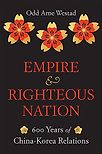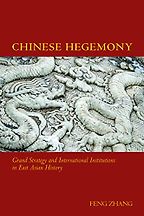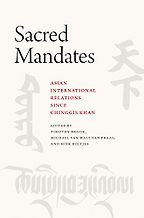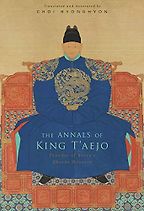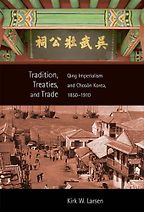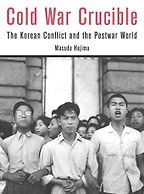Before we get into your book choices, can you just quickly tell us a bit about the book you’ve just written, Empire and Righteous Nation and why you think the historical context of China Korea relations are particularly important to understand now?
It’s quite obvious that we are all, to some extent, held hostage by the nuclear developments on the Korean peninsula of the DPRK, North Korea’s nuclear programme and the consequences of that, which could be quite terrible in the long term. So there is a focus on Korea in international affairs because of that. That was not the main reason why I decided to do this book. It was one concern, but I was primarily preoccupied with trying to figure out where China is going in terms of international affairs. And it struck me that one good way of doing that was to look at how China has dealt with and interacted with what is probably its closest neighbour, both geographically and culturally, over time. So it was really that that pushed me in the direction of looking at this particular relationship now.
Your first book is Feng Zhang, Chinese Hegemony: Grand Strategy and International Institutions in East Asian History. Tell us why you chose this book.
As an international relations scholar, political scientist Feng Zhang wants to look at the development of China’s international affairs through the lens of the past. He is a social scientist who works on historical material. He wrote this book a couple of years ago. It deals primarily with the Ming era in Chinese history, and how that particular empire tried to deal with the relations with its neighbours in eastern Asia. And what he argues, and I think it is brilliantly observed, is that many of the Chinese approaches that you see later on in history, both during the Qing empire which followed the Ming at the beginning of the 17th century, and the People’s Republic today, have been much influenced by the arrangements, standards and approaches set up by the Ming empire. And the title gives it away, it is about hegemony. It’s about setting up an international system in which China is definitely at the centre, but without there necessarily being an adversarial relationship with other countries. It is hierarchic, it is hegemonic, but it also emphasises stability and order and, to some extent, reciprocity.
And does he draw out lessons about China’s relationship with the West and African countries or other countries it has relationships with today?
He’s not a determinist. He’s not someone who says that, because this was developed as a standard half a millennium ago, it is something that determines China’s relationship to the rest of the world today. He’s quite good at saying that it doesn’t necessarily follow that China’s historical relationships with its neighbours within its own cultural region will be the pattern for the relationships it forms with countries that are further away, and more different from itself. But he is quite insistent on this idea of hierarchy being at the centre of Chinese foreign relations, and not necessarily hierarchy in the sense of China being on top in all matters, but there is a natural hierarchy of states. It is not based on a post-Westphalian idea of sovereignty being equal for everyone, and therefore all states, at least in principle, having the same value. The Chinese approach is very clearly that there are great powers and the smaller states are not equal—which, in terms of how international relations has been conducted over the past 500 years, and not just by the Chinese, is a pretty acute observation.
Let’s move on to Sacred Mandates: Asian International Relations Since Chinggis Khan. What does this book add to the picture?
This is particularly interesting as an introduction for people who don’t know much about the historical background to Eastern Asian international affairs. What it tries to do is to argue that there are separate traditions that go beyond the way we in the West generally understand international affairs that come out of the East Asian past. It’s a perfect complement, in many ways, to what Feng Zhang argues, but it’s much broader. It looks not just at Chinese approaches but also looks at Japan, Korea, Vietnam, Tibet, and the whole wider region.
And it’s very interesting to think about what matters and what matters less in international affairs in eastern Asia over the last millennium, which is really what the authors are looking at. There are very significant differences between the region and the West. One of the things that comes out of the book is that the idea that many people hold in the UK or in the US or in Europe, about there being a sort of common ground for understanding international affairs, which is very much built on the Western tradition, is not given.
“The Chinese approach is very clearly that there are great powers and the smaller states are not equal”
Understanding these differences in terms of approaches and traditions is very important. And that’s what the authors try to do. It’s a wonderfully edited book. It was set up as an integrated project, so the editors have written part of the text jointly. And then there are others who have very clear definitions in terms of what they’re doing to contribute to that overall thesis, whether authors are working on Tibet or Korea. It comes together well.
Next up is The Annals of King T’aejo: Founder of Korea’s Choson Dynasty.
This is the man who founded the Choson kingdom in Korea at the end of the 14th century. It is really interesting, not just because it’s a great picture of a time and a place that is quite foreign to most of us, but also because of what he tried to do. So his project—besides setting himself up as king and taking the country away from the people who had ruled before him—was to construct the state based on a particular understanding of neo-Confucianism. It’s a very ideologically driven project that he’s at the head of. And the reason he’s doing this is that he believes that, in order to allow people to live good, honest, productive and righteous lives, you have to have certain standards of human behaviour that the state helps to produce or reproduce in terms of responsibilities, work and family—all of that. This is a fascinating look into that process, but also into his mind, what he and those around him talked about.
And are these Annals actually written by him? Or are they written by a courtier or someone like that?
These are the official records of his rule, compiled by state historians after he died. But they are based on documents and verbatim transcripts from T’aejo’s time in power. It was a collective project, similar to what used to happen in Imperial China, one wrote the history of the ancestors, the predecessors, so subsequent generations could learn from it. That’s how this one came into being as well. The T’aejo Annals were particularly difficult to put together because he was the founder of a dynasty and had overthrown a kingdom that had been in place for hundreds of years. It took five years to compile them, and many different versions before the historians agreed on what to include. Even so, they present a remarkably detailed picture of T’aejo and his world.
And he shifted Korea from Buddhism to Confucianism, is that right?
Yes. Confucianism existed in Korea before and it was pretty well established. But he made it the state ideology. That’s what made him a seminal figure in Korean history and, in many ways, in East Asian history, because there hadn’t been an experiment like that before. The Ming Emperor in China, who came to power roughly at the same time, was also preoccupied with neo-Confucianism. This is one of the things that these two countries have in common, but it was so much more profound in Korea, so much more intense as a social and intellectual project.
Let’s move on to Tradition, Treaties and Trade: Qing Imperialism and Choson Korea 1850-1910 by Kirk W. Larsen. What does this book tell us and why is this period such a crucial one?
So this one comes right at the tail end of imperial developments in eastern Asia, just when the Qing empire is collapsing in China and Korea goes from being firmly associated with China to being attacked and then colonized by Japan. So it’s a pretty dramatic story and Larsen tells it really well. It’s a very well written book but he also has some really important points to make. The first one is that what happens in East Asia at the end of the 19th century is not just the story that we generally hear, about Western imperialism, and then the weakness of the Qing empire that gets gradually weaker, and then collapses.
Get the weekly Five Books newsletter
Larsen’s story is different from that. He sees these empires, Western and Asian, very much as robbers in the same market. What the Qing tried to do, and did quite successfully for a while, was to remake itself into an imperialist power much more along Western lines. By looking at Korea, he shows that what the Qing leaders wanted to do was to transform that imperial relationship with Korea into a kind of colonial relationship, not colonial in terms of settler colonialism, but in terms of Korea having the same kind of subservient relationship to China, as say, Algeria had to France or Ireland had to Britain. And they failed in that, in part because they came up against another imperialism that was more powerful than they were—the Japanese. But the Koreans resisted it as well. This was not what they had bargained for in their relationship with Qing China. They saw themselves as vassals of the Qing empire, but not a colony.
And why did China try and shift that relationship from vassalage to a more direct imperial project? Was it because of a Japan threat or was it due to other developments?
I think it was because both Japan and the Western empires were in conflict with the Qing at that point. That was seen as threatening, and the fear was that if these empires were able to get a hold on Korea, then it would be wrested away from any kind of Chinese influence. And the only way of moving this in the direction that the Qing empire wanted was to use the same instruments as the western empires—economic and administrative subservience, which had not existed in the past in the relationship between China and Korea.
Larsen describes it as part of defensive moves by the Qing, which in the end was pretty successful. It didn’t work well in Korea, but it did work in a number of other regions that were on China’s edges, such as Tibet and parts of Central Asia, which is Xinjiang today. They stayed within the empire and became increasingly incorporated into the empire, in part because the Qing were able and willing to use the same methods of colonization as the West had been using in Africa, the Middle East and elsewhere.
The final book is Masuda Hajimu’s, Cold War Crucible: the Korean Conflict and the Post-war World. Tell us about this book and why you chose it.
This one is closer to what I’ve spent most of my career working on, which is the 20th century and China’s international history in that century and up to today. There is a new generation of Korean War historians, who are now coming of age and look differently at this conflict than what has been the case before. Masuda is a fine example of that.
Up to quite recently, what we read about the war has been mainly military history or diplomatic history. And what Masuda wants to do is to look at it from below, at the experiences of Chinese and Koreans, Americans, and the smaller numbers of others who were involved in the war. But he also wants to look at the impact the war had on setting up the post-war world, particularly with regard to East Asia. So, it emphasises the social and ideological effects of the war much more than the actual military history of the war itself. And I think it is a fine example of that kind of history of conflict.
And what are the broad points it makes about the post-war world? Is it saying that the Korean conflict had some sort of paradigmatic role in setting the terms of engagement?
Yes, it did set a pattern, particularly in Asia, but also further afield for what kind of Cold War conflicts emerged. These were highly militarised and highly absolutist in ideological terms and with a strong element— which Masuda is very alert to—of ideological and political rivalry within countries themselves, where the war is actually fought. So one of the great things about Masuda’s book is that he doesn’t argue what many Western and some Korean historians have argued in the past, which is that this was a Cold War conflict that just happened to be fought on Korean soil.
Five Books interviews are expensive to produce. If you're enjoying this interview, please support us by donating a small amount.
He argues that the ideological divisions among Koreans, many of which have lasted until today, also contributed very significantly to this war and the way it was fought. And much of the intensity of it, the ideological intensity of it, is connected to concepts of what in my book I call righteousness, the absolute conviction by various forms of Korean nationalists that they were fighting for a righteous cause, and that only their version of Korea could be seen as valid.
The Cold War has been finished 30 years now. We’ve had President Trump’s attempts to reach out to North Korea. Is there any solution to the cold Korean conflict as it currently exists? Is there any chance of reunification and, if there is, what needs to be in place to bring it about?
I’m absolutely convinced that Korea, sooner or later, will be reunified. This is a country that has a very, very long tradition of being unified. Korea has a history as one integrated country that stretches far further back than most Asian, or for that matter, European countries. I find it really hard to believe that, in a longer historical perspective, this division of the country through an entirely arbitrary line drawn straight across the Korean Peninsula, is going to last. The question is how we get from here to there. And even though I say that I believe Korean reunification is unavoidable and that sounds very positive and good, it could happen in ways that are quite terrible, through war and conflict. That’s what you have to avoid. I think the only way in which it can be avoided is through some kind of security regime for the Korean Peninsula, in which the two Korean states themselves are in the lead in terms of negotiations, not to end the ideological conflict—I don’t think that’s possible—but to develop security arrangements that will avoid accidental war, and that will lessen overall tensions.
That would probably contribute to change within North Korea speeding up. The more secure in terms of international arrangements the North Korean regime feels itself to be, the more likely it is that there will be room for change within North Korea. That, ultimately, will lead to the end of that regime without any doubt. I’ve said this before many times but Korea is not Cold War Germany. It doesn’t have the same kind of dependence on a foreign great power. It is, in many ways, dependent on China, as Germany was dependent on the Soviet Union, but not in the same way. The legitimacy and authority of the North Korean regime doesn’t derive from its relationship with China in the same way as East Germany derived its legitimacy from the Soviet Union.
“I’m absolutely convinced that Korea, sooner or later, will be reunified”
But there are some similarities to do with the idea that it’s only through some kind of participation in the country’s political and economic life that it will be possible to overcome the endemic poverty and economic stagnation that North Korea seems to be facing at the moment. And that’s the parallel to what happened in East Germany. East German protesters in Leipzig and elsewhere started chanting, ‘We are the people!’ And from there to saying, ‘We are one people’ is not very far. That’s what I think will happen at some point. But it’s very important that we get there without a war between the two sides, which would destroy so much of what has been achieved not just in Korea, but in the whole region.
Is the relationship of North Korea to China that of a vassal state in the old fashioned way you spoke about earlier? What is the relationship there? And is that changing? Does China increasingly see the existence of North Korea as something destabilising, and would it ever make a push for Korean reunification?
I think the current Chinese leadership under Xi Jinping is not quite there. There are people who are writing quite openly in China today that the value for China of having a relationship with North Korea is close to zero. Not only do the North Koreans not contribute anything in terms of China’s own development, but they also have a tendency to speak ill of the Chinese leaders as soon as Beijing does something that North Korea doesn’t agree with. North Korea is not a model ally. It is not the kind of alliance relationship that imperial China would have expected from a Korean vassal. But, on the other hand—and this is what I try to argue in my own book—there are very important parts of the past that link the two. The Korean War is a very significant part of all of that but it goes deeper. There are Confucian elements in the governance of both countries, both in North Korea and China, and that is something that some Chinese communist leaders see the two as having in common, more than the kind of very open, free-for-all society that they see in South Korea—never mind the close association that South Korea has with the United States. So I think that is part of the background that needs to be understood in this very complex relationship between China and North Korea.
Five Books aims to keep its book recommendations and interviews up to date. If you are the interviewee and would like to update your choice of books (or even just what you say about them) please email us at [email protected]

